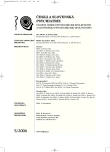Eye Movements in Specific Developmental Dyslexias
Oční pohyby u specifických vývojových dyslexií
Specifická vývojová dyslexie patří k nejčastějším poruchám učení. V současné době existuje mnoho důkazů, že dyslexie není pouze funkční porucha, ale má neurobiologickou příčinu. V následujícím přehledném článku shrnujeme abnormity očních pohybů nacházené u dyslektiků při čtení i řešení neverbálních úloh, jejich patofyziologický význam a vztah k současným teoriím dyslexie. Docházíme k závěru, že neuropsychologické heterogenitě dyslektiků odpovídají i heterogenní nálezy abnormit očních pohybů. Tyto abnormity by mohly v některých případech posloužit ke screeningu předškolních dětí či k vytipování podskupin dyslektiků ke specifické rehabilitaci.
Klíčová slova:
dyslexie, oční pohyby.
Authors:
M. Vyhnálek; R. Brzezný; J. Jeřábek
Authors‘ workplace:
Neurologická klinika dospělých 2. LF UK a FN Motol, Praha
přednosta doc. MUDr. M. Bojar, CSc.
Published in:
Čes. a slov. Psychiat., 102, 2006, No. 5, pp. 256-260.
Category:
Comprehensive Reports
Overview
Specific developmental dyslexia belongs to most frequent learning disorders. At the present time there are many proofs that dyslexia is not just a functional disorder, but it includes a neurobiological cause. In the subsequent review article the authors summarize abnormities of ocular movements, observed in subjects suffering from dyslexia during reading and solving nonverbal tasks, their pathophysiological importance and relation to present theories of dyslexia. The authors arrive at the conclusion that neuropsychological heterogeneity of subjects with dyslexia is reflected in findings of ocular movement abnormalities. These abnormalities should in some cases serve for screening of pre-school children or to select subgroups of dyslexic patients to specific rehabilitation.
Key words:
dyslexia, eye movements.
Labels
Addictology Paediatric psychiatry PsychiatryArticle was published in
Czech and Slovak Psychiatry

2006 Issue 5
- Hope Awakens with Early Diagnosis of Parkinson's Disease Based on Skin Odor
- Memantine in Dementia Therapy – Current Findings and Possible Future Applications
- Memantine Eases Daily Life for Patients and Caregivers
- Deep stimulation of the globus pallidus improved clinical symptoms in a patient with refractory parkinsonism and genetic mutation
Most read in this issue
- Less Common Psychiatric Disorders
- The Role CYP2D6 in the Treatment with Selective Inhibitors of Serotonin Reuptake
- Eye Movements in Specific Developmental Dyslexias
- Psychotherapeutic Alternatives in Depression Treatment
